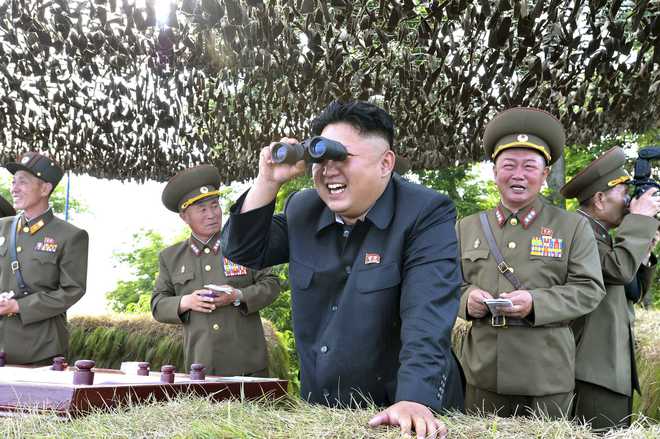Seoul, January 6
North Korea said on Wednesday it had carried out a “successful” hydrogen bomb test, a claim that — if true — massively raises the stakes over the hermit state’s banned nuclear programme.
Neighbouring South Korea’s National Security Council “strongly condemned” the test, while Japanese Prime Minister described it as a “great threat” that represented a gross violation of UN Security Council resolutions.
“The republic’s first hydrogen bomb test has been successfully performed at 10.00am (0330 GMT),” North Korean state television announced.
“With the perfect success of our historic H-bomb, we have joined the rank of advanced nuclear states,” it said, adding that the test was of a miniaturised device.
A hydrogen, or thermonuclear device, uses fusion in a chain reaction that results in a far more powerful explosion than the fission blast generated by uranium or plutonium alone.
Last month, North Korean leader Kim Jong-Un suggested Pyongyang had already developed a hydrogen bomb.
The claim was questioned by international experts and there was continued scepticism over Wednesday’s test announcement.
(Read: UN Security Council to consider new sanctions on N Korea)
“This weapon was probably the size of the US Hiroshima bomb but this was not a hydrogen bomb. It was fission technology,” Bruce Bennett, a senior defence analyst with the Rand Corporation told the BBC.
“The bang they should have gotten would have been 10 times greater than what they got,” Bennett said.
Given the estimated yield, the device was “unlikely to be a true 2-stage thermonuclear bomb,” tweeted James Acton, co-director of the nuclear policy program at the Carnegie Endowment for International Peace.
The test, which came just two days before Kim Jong-Un’s birthday, was initially detected by international seismology monitors as a 5.1-magnitude tremor next to the North’s main Punggye-ri nuclear test site in the northeast of the country.
Most experts had assumed Pyongyang was years from developing a thermonuclear bomb, while assessments were divided on how far it had gone in mastering the technology to miniaturise a warhead.
Whether an H-bomb or not, it was North Korea’s fourth nuclear test and marked a striking act of defiance that flew in the face of enemies and allies alike who have warned Pyongyang it would pay a steep price for moving forward with its nuclear weapons programme.
Earthquake reported near test site
An earthquake that appears to have been man-made near a known nuclear testing site in North Korea was detected by several monitoring agencies on Wednesday.
The United States Geological Service reported a 5.1 magnitude quake that South Korea said was 49 kms (30 miles) from the Punggye-ri site where the North has conducted nuclear tests in the past.
“We suspect a man-made earthquake and are analysing the scale and epicentre of the quake with the geoscience and mineral resource institute of South Korea,” a Korea Meteorological Administration official told Reuters by phone.




 Number of Indian Americans in elected offices not reflective of their population: Kamala Harris
Number of Indian Americans in elected offices not reflective of their population: Kamala Harris





























